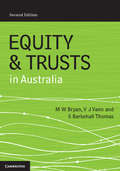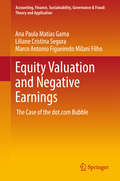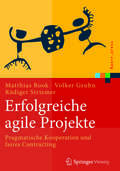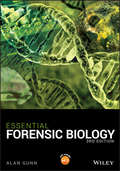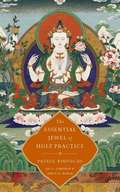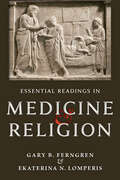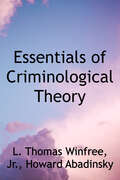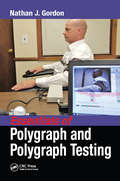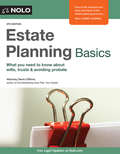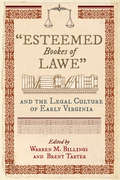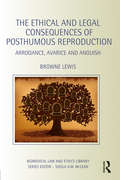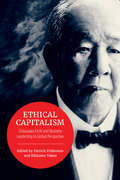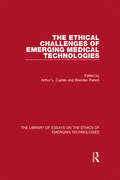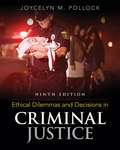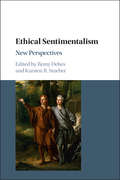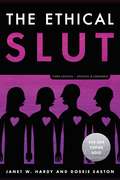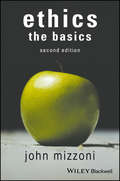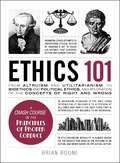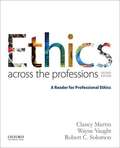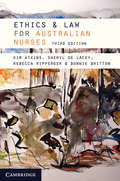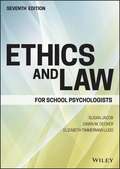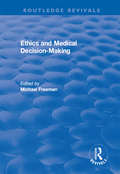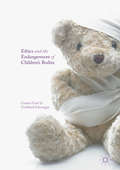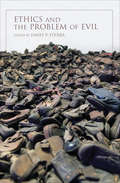- Table View
- List View
Equity and Trusts in Australia
by Thomas Bryan M W Vann V J S BarkehallIncorporating recent case law developments, the second edition of Equity and Trusts in Australia provides undergraduate and Juris Doctor students with a current and accessible introduction to Australian equitable and trust law. Expanding upon first edition content, the text includes greater depth of topic discussion, explanation of key theories and terminology, while demonstrating how these are applied in practice. Chapters including Fiduciary Obligations, Resulting Trusts and Constructive Trusts have been reworked to strengthen the text's coverage of all facets of equity and trusts law. Equity and Trusts in Australia, second edition links key doctrines to their wider relationship with the law, making it a fundamental text for students embarking on this area of study for the first time.
Equity Valuation and Negative Earnings
by Ana Paula Matias Gama Liliane Cristina Segura Marco Antonio Figueiredo Milani FilhoBuilding upon Feltham and Ohlson models, this book examines positive loss-earnings within the context of the dot. com bubble during the boom years of the late 1990s bull market. The strong demand for equity financing captured the imagination of investors from Europe and U. S. like never before. With a focus on U. S. Internet companies, the book explores both the birth and the death of the new economy, and how negative earnings and losses still garnered large investments and successful IPOs (Initial Public Offerings). As Internet based ventures and the digital economy keep attracting large amounts of equity financing, this book explains that there is something unique in the valuation and pricing of tech companies. The book was written for corporate financiers, capital market professionals, and academics to further their understanding of equity valuation and the effects of equity trading.
Erfolgreiche agile Projekte: Pragmatische Kooperation und faires Contracting (Xpert.press)
by Matthias Book Volker Gruhn Rüdiger StriemerDas Buch beschreibt pragmatische Instrumente und Methoden, die Software-Entwicklern und Fachexperten dabei helfen, ein gemeinsames Problem- und L#65533;sungsverst#65533;ndnis zu entwickeln und Projekte so zu managen, dass Risiken fair zwischen Auftraggeber und Auftragnehmer verteilt werden. Teil 1 beleuchtet kurz die agile Entwicklungspraxis im kommerziellen Umfeld. Teil 2 beschreibt den Interaction Room, in dem Entwickler und Fachexperten auf gleicher Augenh#65533;he zusammenarbeiten. Teil 3 beschreibt das Preis- und Vertragsmodell adVANTAGE, das die Br#65533;cke zwischen agiler Philosophie und vertraglich fixierten Leistungserwartungen schl#65533;gt. Teil 4 illustriert die Methoden am Beispiel einer industriellen Fallstudie, bevor Teil 5 ein modernes Qualifikationsprofil aufstellt. Das Buch wendet sich an CIOs, Projektmanager und Entwickler, die Risiken in ihren Projekten fr#65533;her erkennen, souver#65533;ner mit der Ungewissheit komplexer Projekte umgehen und effektiver mit Kunden bzw. Dienstleistern kooperieren wollen.
Eros and Illness
by David B. MorrisWhen we or our loved ones fall ill, our world is thrown into disarray, our routines are interrupted, our beliefs shaken. David Morris offers an unconventional, deeply human exploration of what it means to live with, and live through, disease. He shows how desire—emotions, dreams, stories, romance, even eroticism—plays a crucial part in illness.
Essential Forensic Biology: Animals, Plants And Microorganisms In Legal Investigation
by Alan GunnA completely revised and updated edition that teaches the essentials of forensic biology, with increased coverage of molecular biological techniques and new information on wildlife forensics, wound analysis and the potential of microbiomes as forensic indicators This fully revised and updated introduction to forensic biology carefully guides the reader through the science of biology in legal investigations. Full-colour throughout, including many new images, it offers an accessible overview to the essentials of the subject, providing balanced coverage of the range of organisms used as evidence in forensic investigations, such as invertebrates, vertebrates, plants and microbes. The book provides an accessible overview of the decay process and discusses the role of forensic indicators like human fluids and tissues, including bloodstain pattern analysis, hair, teeth, bones and wounds. It also examines the study of forensic biology in cases of suspicious death. This third edition of Essential Forensic Biology expands its coverage of molecular techniques throughout, offering additional material on bioterrorism and wildlife forensics. The new chapter titled ‘Wildlife Forensics’ looks at welfare legislation, CITES and the use of forensic techniques to investigate criminal activity such as wildlife trafficking and dog fighting. The use of DNA and RNA for the identification of individuals and their personal characteristics is now covered as well, along with a discussion of the ethical issues associated with the maintenance of DNA databases. Fully revised and updated third edition of the successful student-friendly introduction to the essentials of Forensic Biology Covers a wide variety of legal investigations such as homicide, suspicious death, neglect, real and fraudulent claims for the sale of goods unfit for purpose, the illegal trade in protected species of plants and animals and bioterrorism Discusses the use of a wide variety of biological material for forensic evidence Supported by a website that includes numerous photographs, interactive MCQs, self-assessment quizzes and a series of questions and topics for further study to enhance student understanding Includes a range of important, key case studies in which the difficulties of evaluating biological evidence are highlighted Essential Forensic Biology, Third Edition is an excellent guide for undergraduates studying forensic science and forensic biology.
The Essential Jewel of Holy Practice
by Jay L. Garfield Emily W. McRaeAn exquisite poem from one of Dzogchen’s greatest teachers.The Essential Jewel of Holy Practice is a vibrant philosophical and ethical poem by one of Tibet’s great spiritual masters. Patrul Rinpoche presents a complete view of the path of liberation from the perspectives of the Madhyamaka understanding of emptiness and the Mahayana ideal of compassionate care refracted through the Dzogchen perspective on experience, yielding a sophisticated philosophical approach to practice focusing on the cultivation of clear, open, luminous, empty awareness and of liberation leading to the transformation of one’s moral capacity and sensitivity. Patrul Rinpoche’s verses speak intimately and directly to the reader and inspire one to develop one’s mind for the sake of ethical perfection and liberation. The translators’ introduction provides a foundation for reading the poem and their commentary to the verses assists the reader in understanding Patrul Rinpoche’s allusions and technical terms.
Essential Readings in Medicine & Religion
by Gary B. Ferngren Ekaterina N. Lomperis“[A] useful, well-edited anthology of important texts in the history of the intersection of religion and medicine.” —Warren Kinghorn, MD, ThD, Duke University Medical Center and Duke Divinity SchoolGary B. Ferngren and Ekaterina N. Lomperis have gathered a rich collection of annotated primary sources that illustrate the intersection of medicine and religion. Intended as a companion volume to Ferngren’s classic Medicine and Religion, which traces the history of the relationship of medicine to religion in the Western world from the earliest ancient Near Eastern societies to the twenty-first century, this useful and extensive sourcebook places each key document in historical context.Drawing from more than 160 texts, the book explores a number of themes, including concepts of health, the causes and cure of disease, medical ethics, theodicy, beneficence, religious healing, consolation, and death and dying. Each chapter begins with an introduction that furnishes a basic historical setting for the period covered. Modern translations, some of which have been made especially for this volume, are used whenever possible. The texts are numbered sequentially within each chapter and preceded by a short introduction to both the author and the subject.Touching on Mesopotamia, Egypt, Israel, Greece, Rome, the European Middle Ages, Islam, early modern Europe, and the modern era, Essential Readings in Medicine and Religion brings a wide range of sources together to expand on the crucial lessons of Medicine and Religion. This book is a useful introduction for all students of history, divinity, medicine, and health.
Essentials of Criminological Theory
by L. Thomas Winfree Howard AbadinskyThis concise textbook introduces students to multidisciplinary theories about why people commit crime. Winfree and Abadinsky strive to make the study of crime and justice as clear, concise, current, and consumable as possible. Tracing the evolution of theories and their influence on research today, the authors provide a solid foundation for students to understand the role theory plays in criminal justice practices. The first nine chapters explore various types of theories, providing the historical context and the basic assumptions each theory makes about human behavior, the causal arguments, and what criminologists have learned from testing the theories. The theory as originally proposed may have gone through a metamorphosis. Change is an important—and exciting—aspect of crime theory. Ideas that attempt to describe, explain, predict, and possibly control a specific behavior sometimes remain as originally conceived and sometimes evolve to something quite different. The final chapter explores the ways the various theories influence criminal justice policy, focusing on law enforcement.
Essentials of Polygraph and Polygraph Testing
by Nathan J. GordonThroughout history, there has been an intrinsic need for humans to detect deception in other humans. Developed in 1923, the polygraph machine was a tool designed to do just this. To date, there have been many improvements made to the basic polygraph instrument. This book outlines the instrumentation as well as the latest in questioning techniques and methods available to the professional interviewer to determine truth from deception. The book covers psychology and physiology, a history of polygraph with the advances of leading figures, question formulation, data analysis, legal implications and legal cases, and the author’s developed technique Integrated Zone Comparison Technique (IZCT).
Estate Planning Basics
by Denis CliffordThis book provides concise, straightforward, and easy-to-read information about the major components of estate planning – without going into endless detail about arcane options that apply only to the wealthy. Topics include: choosing beneficiaries estate planning by parents with minor children wills living trusts avoiding probate trusts for people in a second marriage, and planning for incapacity. Best-selling Nolo author Denis Clifford uses plain-English to make these estate planning issues easy to understand, and he lets you know which tasks you can handle yourself, and when you’ll need a lawyer’s help.
"Esteemed Bookes of Lawe" and the Legal Culture of Early Virginia (Early American Histories)
by Brent Tarter Warren M. BillingsVirginia men of law constituted one of the first learned professions in colonial America, and Virginia legal culture had an important and lasting impact on American political institutions and jurisprudence. Exploring the book collections of these Virginians therefore offers insight into the history of the book and the intellectual history of early America. It also addresses essential questions of how English culture migrated to the American colonies and was transformed into a distinctive American culture. Focusing on the law books that colonial Virginians acquired, how they used them, and how they eventually produced a native-grown legal literature, this collection explores the law and intellectual culture of the Commonwealth and reveals the origins of a distinctively Virginian legal literature. The contributors argue that understanding the development of early Virginia legal history—as shown through these book collections—not only illuminates important aspects of Virginia’s history and culture; it also underlies a thorough understanding of colonial and revolutionary American history and culture.
The Ethical and Legal Consequences of Posthumous Reproduction: Arrogance, Avarice and Anguish (Biomedical Law and Ethics Library)
by Browne LewisPosthumous reproduction refers to the procedure that enables a child to be conceived using the gametes of a dead person. Advances in reproductive technology mean it is now possible to assist in creating a life after you die, and in recent years the number of women who have attempted to get pregnant using posthumous reproduction has increased. However, the law in many jurisdictions has not put regulations in place to deal with the ethical and legal consequences that arise as a result of posthumous reproduction. This is the first book to exclusively focus on posthumous reproduction. The book comprehensively explores the legal and ethical issues surrounding posthumous reproduction in a number of jurisdictions including the US, Israel, the UK and France. The book looks at a number of issues including: ascertaining the wishes of the dead and protecting the reproductive rights of men who have deposited frozen sperm in clinics prior to their deaths; cases involving people who want to acquire fresh sperm from deceased or incompetent men and determining who should have the right to accept the sperm; identifying the parents of the posthumously conceived child; and discussing the need to promote the best interests of the child. The book critically examines the current laws that are in place and proposes additional regulations and policies in order to effectively regulate posthumous reproduction.
Ethical Capitalism: Shibusawa Eiichi and Business Leadership in Global Perspective
by Kikkawa Takeo Patrick FridensonShibusawa Eiichi (1840–1931) was a Japanese banker and industrialist who spearheaded the modernization of Japanese industry and finance during the Meji Restoration. He founded the first modern bank in Japan and his reforms introduced double entry accounting and joint-stock corporations to the Japanese economy. Today, he is known as the “father of Japanese capitalism.” Ethical Capitalism is a volume of essays that tackles the thought, work, and legacy of Shibusawa Eiichi and offers international comparisons with the Japanese experience. Eiichi advocated for gapponshugi, a principle that emphasized developing the right business, with the right people, in service to the public good. The contributors build a historical perspective on morality and ethics in the business world that, unlike corporate social responsibility, concentrates on the morality inside firms, industries, and private-public partnerships. Ethical Capitalism is not only a timely work; it is a necessary work, in a rapidly globalizing world where deregulation and lack of oversight risk repeating the financial, environmental, and social catastrophes of the past.
The Ethical Challenges of Emerging Medical Technologies (The\library Of Essays On The Ethics Of Emerging Technologies Ser.)
by Arthur L. Caplan Brendan ParentThis collection of essays emphasizes society’s increasingly responsible engagement with ethical challenges in emerging medical technology. Expansion of technological capacity and attention to patient safety have long been integral to improving healthcare delivery but only relatively recently have concepts like respect, distributive justice, privacy, and autonomy gained some power to shape the development, use, and refinement of medical tools and techniques. Medical ethics goes beyond making better medicine to thinking about how to make the field of medicine better. These essays showcase several ways in which modern ethical thinking is improving safety, efficacy and efficiency of medical technology, increasing access to medical care, and empowering patients to choose care that comports with their desires and beliefs. Included are complimentary ethical approaches as well as compelling counter-arguments. Together, the articles demonstrate how improving the quality of medical technology relies on every stakeholder -- not just medical researchers and scientists -- to assess each given technology’s strengths and pitfalls. This collection also portends one of the next major issues in the ethics of medical technology: developing the requisite moral framework to accompany shifts toward patient-centred personalized healthcare.
Ethical Dilemmas And Decisions In Criminal Justice, 9th Edition
by Joycelyn M. PollockPacked with current, real-world examples, the text offers comprehensive coverage of ethics across all three arms of the criminal justice system: the police, the courts, and corrections. It combines coverage of the philosophical principles and theories that are the foundation of ethical decision-making with the latest challenges and issues in criminal justice -- militarization of the police, mass imprisonment, wrongful convictions, the misuse of power by public servants, and more. <P><P> Hands-on exercises, real-life cases, and practical scenarios illustrate the significance of ethics in today's criminal justice arena. Whether you plan to work in the field of policing, courts, or corrections, this book delivers the information and tools you need to deal effectively with ethical challenges on the job.
Ethical Sentimentalism: New Perspectives
by Remy Debes Stueber Karsten R.In recent years there has been a tremendous resurgence of interest in ethical sentimentalism, a moral theory first articulated during the Scottish Enlightenment. Ethical Sentimentalism promises a conception of morality that is grounded in a realistic account of human psychology, which, correspondingly, acknowledges the central place of emotion in our moral lives. However, this promise has encountered its share of philosophical difficulties. Chief among them is the question of how to square the limited scope of human motivation and psychological mechanism - so easily influenced by personal, social, and cultural circumstance - with the seeming universal scope and objective nature of moral judgment. The essays in this volume provide a comprehensive evaluation of the sentimentalist project with a particular eye to this difficulty. Each essay offers critical clarification, innovative answers to central challenges, and new directions for ethical sentimentalism in general.
The Ethical Slut, Third Edition: A Practical Guide to Polyamory, Open Relationships, and Other Freedoms in Sex and Love
by Dossie Easton Janet W. HardyThe classic guide to love, sex, and intimacy beyond the limits of conventional monogamy has been fully updated to reflect today's modern attitudes and the latest information on nontraditional relationships. For 20 years The Ethical Slut has dispelled myths and showed curious readers how to maintain a successful polyamorous lifestyle through open communication, emotional honesty, and safer sex practices. The third edition of this timeless guide to communication and sex has been revised to include interviews with poly millennials (young people who have grown up without the prejudices their elders encountered regarding gender, orientation, sexuality, and relationships), tributes to poly pioneers, and new sidebars on topics such as asexuality, sex workers, and ways polys can connect and thrive. The authors also include new content addressing nontraditional relationships beyond the polyamorous paradigm of "more than two": couples who don't live together, couples who don't have sex with each other, nonparallel arrangements, couples with widely divergent sex styles, power disparities, and cross-orientation relationships, while utilizing nonbinary gender language and new terms that have come into common usage since the last edition.
Ethics: The Basics, 2nd Edition
by John MizzoniUpdated and revised, Ethics: The Basics, Second Edition, introduces students to fundamental ethical concepts, principles, theories, and traditions while providing them with the conceptual tools necessary to think critically about ethical issues. Introduces students to core philosophical problems in ethics in a uniquely reader-friendly manner Lays out clearly and simply a rich collection of ethical concepts, principles, theories, and traditions that are prevalent in today’s society Considers western and non-western viewpoints and religious interpretations of ethical principles Offers a framework for students to think about and navigate through an array of philosophical questions about ethics
Ethics 101: From Altruism and Utilitarianism to Bioethics and Political Ethics, an Exploration of the Concepts of Right and Wrong (Adams 101)
by Brian BooneExplore the mysteries of morality and the concept of right and wrong with this accessible, engaging guide featuring basic facts along with an overview of modern-day issues ranging from business ethics and bioethics to political and social ethics.Ethics 101 offers an exciting look into the history of moral principles that dictate human behavior. Unlike traditional textbooks that overwhelm, this easy-to-read guide presents the key concepts of ethics in fun, straightforward lessons and exercises featuring only the most important facts, theories, and ideas. Ethics 101 includes unique, accessible elements such as: -Explanations of the major moral philosophies including utilitarianism, deontology, virtue ethics, and eastern philosophers including Avicenna, Buddha, and Confucius. -Classic thought exercises including the trolley problem, the sorites paradox, and agency theory -Unique profiles of the greatest characters in moral philosophy -An explanation of modern applied ethics in bioethics, business ethics, political ethics, professional ethics, organizational ethics, and social ethics From Plato to Jean-Paul Sartre and utilitarianism to antirealism, Ethics 101 is jam-packed with enlightening information that you can’t get anywhere else!
Ethics Across The Professions: A Reader For Professional Ethics
by Wayne Vaught Robert C. Solomon Clancy MartinThe most up-to-date reader with cases in professional ethics available.What does it mean to be an ethical professional? A professional career can be so demanding that it permeates every aspect of a person's life and personality. In light of this fact, it is especially important for students who are planning to enter a chosen profession to understand its moral status,moral virtues, and possible moral pitfalls, so that they will be equipped to deal with the inevitable moral quandaries that they will encounter as professionals.The most up-to-date professional ethics reader available, Ethics Across the Professions analyzes the complex ethical issues that arise in such fields as engineering, finance, healthcare, journalism, and law. Featuring a wide array of both classic and contemporary sources, it ranges from works byAristotle and Kant to selections by Michael Bayles, Sissela Bok, Paul Ekman, and Thomas Nagel. Organized topically, the anthology covers what it means to be a professional, outlines several ethical models, and addresses key issues including deception in professional life, privacy, loyalty, socialwelfare, conflicts of interest, and self-regulation. The book includes detailed chapter introductions, several practical case studies at the end of each chapter, and provocative discussion questions on issues like "whistle-blowing," the Iraq War, educating illegal immigrant children, andadvertisements for pharmaceutical companies. Edited by three renowned ethicists, Ethics Across the Professions is especially suited for introductory professional ethics courses taught in philosophy departments as well as in nursing schools, business schools, and other professional programs.
Ethics and Law for Australian Nurses
by Kim Atkins Bonnie Britton De Lacey Sheryl Rebecca RippergerThe third edition of Ethics and Law for Australian Nurses develops an innovative practical framework for understanding the ethical and legal dimensions of nursing practice in Australia. Taking a 'relational' approach to practice, the text foregrounds the concepts of personhood, vulnerability and the nurse-patient relationship as the source of a nurse's moral and legal obligations. This approach is central to the book's discussion of key ethical and legal concepts throughout the text including consent and autonomy, negligence and liability, confidentiality and trust, and culturally safe practice. This edition has been thoroughly revised to include the latest research and methods, updated legislation and links to professional documentation, along with a new chapter on aged care. Student learning is supported by case studies, legal case extracts and learning exercises. A new instructor companion website features a curated suite of multimedia resources and extension questions.
Ethics And Law For School Psychologists (Seventh Edition)
by Jacob Dawn M. Decker Susan Jacob Elizabeth Timmerman LuggThere are a number of excellent texts, journal articles, and book chapters on ethics in psychology, legal issues in school psychology, and special education law. However, in the late 1980s, the authors of the first edition of this book recognized a need for a single sourcebook on ethics and law specifically written to meet the unique needs of the psychologist in the school setting. Consequently, Ethics and Law for School Psychologists was written to provide up-to-date information on ethical principles and standards and law pertinent to the delivery of school psychological services.
Ethics and Medical Decision-Making (Routledge Revivals)
by Michael D. FreemanThis title was first published in 2001: Ethical thinking about medical decision-making has roots deep in history. This collection of contemporary essays by leading international scholars traces the development of modern bioethics and explores the theory and current issues surrounding this widely contested field.
Ethics and the Endangerment of Children's Bodies
by Gunter Graf Gottfried SchweigerThis book addresses the endangerment of children's bodies in affluent societies. Bodily integrity is an important part of a child's physical and mental well-being, but it can also be violated through various threats during childhood; not only affecting physical health but also causing mental damage and leading to distortions in the development of the self. The authors give an account of three areas, which present different serious dangers: (1) body and eating, (2) body and sexuality, and (3) body and violence. Through an in-depth examination of the available theoretical and empirical knowledge, as well as a thorough ethical analysis, the central injustices in the mentioned areas are identified and the agents with responsibilities towards children displayed. The authors conclude by providing invaluable insight into the necessity of an ethical basis for policies to safeguard children and their bodies.
Ethics and the Problem of Evil (Indiana Series in the Philosophy of Religion)
by Marilyn McCord Adams John Hare Linda Zagzebski Laura Garcia Bruce Russell Stephen J. Wykstra Stephen MaitzenProvocative essays that seek &“to turn the attention of analytic philosophy of religion on the problem of evil . . . towards advances in ethical theory&” (Reading Religion). The contributors to this book—Marilyn McCord Adams, John Hare, Linda Zagzebski, Laura Garcia, Bruce Russell, Stephen Wykstra, and Stephen Maitzen—attended two University of Notre Dame conferences in which they addressed the thesis that there are yet untapped resources in ethical theory for affecting a more adequate solution to the problem of evil. The problem of evil has been an extremely active area of study in the philosophy of religion for many years. Until now, most sources have focused on logical, metaphysical, and epistemological issues, leaving moral questions as open territory. With the resources of ethical theory firmly in hand, this volume provides lively insight into this ageless philosophical issue. &“These essays—and others—will be of primary interest to scholars working in analytic philosophy of religion from a self-consciously Christian standpoint, but its audience is not limited to such persons. The book offers illustrative examples of how scholars in philosophy of religion understand their aims and how they go about making their arguments . . . hopefully more work will follow this volume&’s lead.&”—Reading Religion &“Recommended.&”—Choice
